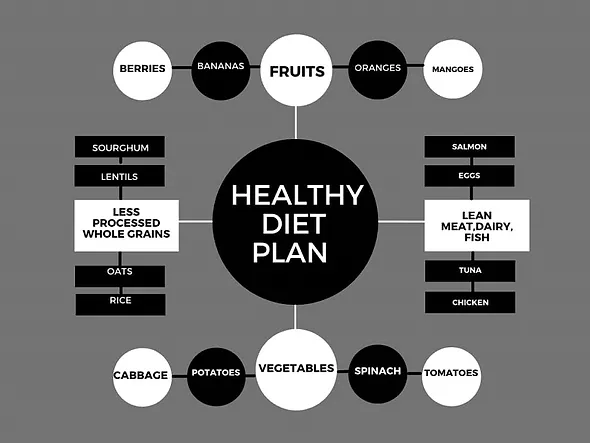It is not very uncommon that on certain days, we tend to experience mood changes that leave us feeling low, sad, or angry. These mood changes can be caused by stress, work, and life challenges. We don’t have any immunity against this.
Our first instinct is to always resort to food to lift our spirits – but choosing to indulge in sugary, high-calorie foods can cause further harm to our bodies. The reason is that foods play important roles in our bodies. Consuming the wrong foods can harm our gut flora while consuming the right foods can benefit our gut flora.
Some foods have scientifically proven to improve our moods because research has established a foundational relationship between nutrition and mental health. It is important to note that there are various factors such as insufficient sleep, stress, genes, and mood disorders that can contribute to mood instability, but certain foods can improve your brain health and mood disorders.
How Does Nutrition Play a Role?
Researchers have found evidence that shows the kind of food we eat daily can affect our moods. Healthy dietary patterns like the Mediterranean diet have proven to have positive effects on mental health. A healthy diet plan includes vegetables, fruits, nuts, seeds, and less processed whole grains with average amounts of lean meat, fish, and dairy.

Other studies have shown that a healthy diet plan can treat depression. An Australian study was conducted to compare the results of two different groups of people with depression. One group was shown how to follow a healthy diet plan while the other group was not. Researchers monitored the changes in their diets to see if there was an improvement in their moods. In a span of 3 months, the symptoms of depression reduced for the people who followed a healthy diet plan.
Discovery hasn’t been established yet on how food can favorably affect our moods, but researchers have come up with many concepts that examine the significance of microorganisms that live in our gut, also known as the gut microbiome, and how the foods we consume affect the gut microbiome. Others examine the functions of various components of foods such as vitamins, minerals, and antioxidants. For example, look at how these dietary components in foods aid in improving and balancing moods by promoting brain health:
- Eating good fats – The human brain is about 60% fat. Fats are beneficial to the nervous system because they aid in brain functionality. Good fats help with the production of neurotransmitters and reduce inflammation.
- Amino acids – certain amino acids are the precursors of protein and brain neurotransmitters that help in promoting better moods and balancing them.
- Balancing blood sugar levels – Eating sugary foods and missing out on meals can destabilize your blood sugar levels which often leads to hormonal imbalances. Studies have shown that low blood sugar (hypoglycemia) is linked to depression and anxiety. Adding complex carbohydrates, protein, and fiber can help with balancing your blood sugar levels.
- B vitamins – The B vitamins help in removing oxidative stress and support the nervous system. Many of the B vitamins like B9 aid in brain health and formulating neurotransmitters.
We have established what dietary components are needed in your food so that whenever you are feeling low, you won’t run to the fridge and indulge in ice cream or order a take out.
So, what are the foods that can boost your moods?
- Fermented Foods
The benefits of fermented foods on health were not yet discovered in the past because fermentation was mainly used for the preservation of foods, to improve food flavorings, and prolong shelf life. Fermented foods have been an important diet in many cultures, but throughout the years, the fermentation process has attracted scientific interest because of its health benefits.
The fermentation involves the process of allowing microorganisms to grow in foods that will be able to convert sugars into alcohol and acids. Probiotics are created during this process.
Research shows there is an important relationship between our gut and the brain. If you have never made gut health your priority, now is the time! About 95% of serotonin is produced in the gut microbiome. Serotonin is a neurotransmitter that affects behavioral characteristics such as mood, stress response, appetite, and sexual drive.
This is why it is important to include fermented foods in your diet because Probiotics support the growth of healthy bacteria and increase serotonin levels.
Different kinds of foods can be fermented. For example, milk products such as (cheese, yogurt, kashk, and kefir), meat products, vegetables (mustard, pickles, and turnips), and fruits.
Fermented foods that are very rich in probiotics include:
- Yogurt
- Kimchi
- Kefir
- Kombucha
- Sauerkraut
Yogurt is the most common fermented food that is rich in probiotics. While it has the same micro-nutrient composition as milk, yogurt contains more vitamin B12 and B2, protein, magnesium, and potassium.
It is important to know that not all fermented foods are great sources of probiotics because of the cooking and filtering the food may go through. For example, sourdough.
- Salmon
Good fats are beneficial for the nervous system and Salmon is a great source of omega-3 fatty acids. Omega-3 fatty acids are a group of essential fats that should be obtained from your diet because your body can’t produce them.
Omega -3 fatty acids, (EPA and DHA) are important for both the nervous system and brain development. EPA and DHA have been shown to lower levels of depression, improve cognition, and reduce oxidative stress.
Studies show that cultures, where individuals consume more fatty fish, are less likely to experience depression or anxiety. Salmon also contains, vitamin B12 and Vitamin D. Vitamin B12 works with vitamin B9 by converting amino acids into neurotransmitters.
- Sunflower seeds
The sunflower plant is a miraculous oilseed crop that is cultivated globally for its seeds. The proteins found in sunflower seeds have a substantial amount of amino acids, minerals, and vitamins such as Vitamin E, Vitamin B6.
Sunflower seeds are a great source of tryptophan. Tryptophan is an amino acid responsible for reducing stress, anxiety, depression, and improve memory enhancement.
- Chia Seeds
Chia seeds are the seeds of Salvia hispanica a flowering plant that belongs to the Lamiaceae family. In the past, chia seeds were cultivated in Aztec during the pre-Columbian times. Chia seeds were as important as maize crops and the Aztecs used to eat chia seeds regularly in their diet due to their high nutritional value. Chia seeds are rich in antioxidants, protein, fiber, Omega- 3 oils, and Omega- 3 fatty acids that aid in the production of neurotransmitters.
- Dark Chocolate
In history, the Mayans and Aztecs used cocoa for various reasons but mostly for ceremonial and medicinal purposes. This is because Chocolate is rich in nutritional value. It contains rich compounds such as antioxidants, magnesium, vitamin B, and various mood-boosting compounds.
A study was conducted to see the effect chocolate had on depression. The results showed that people who were clinically depressed were more likely to eat chocolate. The more depressed the people were the more chocolate they ate. Researchers weren’t able to state that depression stimulates chocolate craving. But concluded the properties found in chocolate affected the mood.
This is because Chocolate contains compounds such as theobromine, caffeine, and phenylethylamine that is responsible for increasing serotonin levels that promote positive moods and reduce depression.
To experience these benefits, you should opt for Dark chocolate because milk chocolate contains added ingredients like fat and sugar.



























